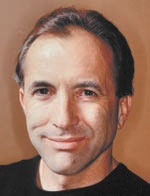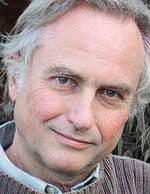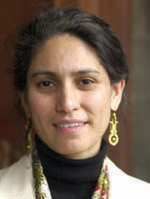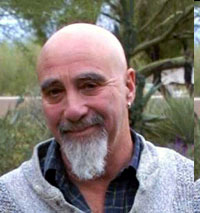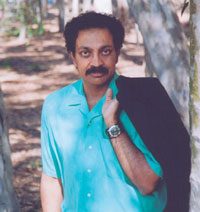
"There is no God, and Mary is His Mother"- George Santayana, Catholic atheist.
I have finally finished Daniel Dennett's book "Darwin's Dangerous Idea". It was perhaps the most difficult book I've read, or finished I should say. It assumes a lot of knowledge in alot of fields and a broad array of background reading in subjects from Architecture to Artificial Intelligence.
The primary theme of this book centers around "cranes" and "skyhooks". Cranes are building blocks of design that create from the ground up through incremental advances. Skyhooks are deus ex machina of one sort or another (usually over-arching unexplainable "miracles" of design).
This book is primarily a refutation of the attempts to invoke "Skyhooks" to explain life/evolution. From the ground floor, the design of nature seems incredibly complex. Our first intuition is obviously to invoke a great big skyhook to explain it all. But as we inspect the cranes of invention we notice that we can gradually understand how things develop in a way which is non-miraculous (I know, it's called reductionism). Take something like Calculus for example. How could someone possibly determine how much snow fell overnight even though the rate of snow varied throughout the night several times, and varied gradually? From the ground floor it seems impossible to understand Calculus. But when we inspect the cranes of Algebra and Trigonometry, we can see how and why Calculus works, and the miraculousness of it fades away as the cranes are understood.
In debates over nature, people continuously invoke skyhooks whenever explanations fail. The skyhooks are invariably replaced by explanatory cranes, and the critics construct ever more skyhooks to keepsake their precious sense of the mysterious. This book is a refutation of the major historical skyhooks.
The first 105 pages of the book are fairly easy to read and I enjoyed them enough to make a deal with devil at the crossroads that I would finish it. After 105 pages it becomes similar to having a discussion with a very smart schizophrenic who keeps citing books and authors he assumes you already know inside and out, while dancing around like a word-salad in a mirrored rat maze. Daniel Dennett doesn't believe strongly in segues. You might read a thousand words on three different subjects wondering where in the hell he is going, and the payoff is not always sweet or rewarding or particularly enlightening. It's like his editor encouraged him to use as many words as possible to explain even the simplest of points. But in this day and age where critics cherry pick and distorts one's views, it is no wonder why these science books are all over 400 pages long. They hold your hand and slowly say it and repeat it then say it again in another form trying their damnest to make it as hard as possible for someone to mischaracterize their ideas. They will anyways, of course.
There have been many assaults on Darwin's dangerous idea- that there are no skyhooks, only cranes. Even those who accept evolution mischaracterize it or do not really accept that it is all just cranes. Just algorithms. Just selection. Just blind. We look up at the precipice of design and insist a designer, or a conscious inventor of an underlying cosmic principle. But yesterday's skyhook is tomorrows well understood crane.
Dennett comes down hard on Steven J. Gould's attempt to poke holes in orthodox Neo-Darwinism. The press and media were excited that the foremost American evolutionary theorist of his time (Gould) would try punching holes in neo-orthodox Darwinian thought, yearning for a place to store the mysterious skyhook they long for. But over the years according to Dennett, Gould's ideas, though helpful in clarification were not the grand dramatic assault hoped for. Take Gould's famous idea of punctuated equilibrium for example- the idea that slow change isn't explanatory enough to account for evolution, but that evolution happens in fits and starts. Gould hoped to find repositories for skyhooks in this theme, as did the multitudes of mysterian onlookers. According to Dennett, Gould was looking for some extraordinary revolution to pin his name to, and although he clarified certain aspects of evolution, his idea was not revolutionary at all. Overall, the attack on neo-Darwinism by Gould and others has been trounced by the overall scientific concensus. They have clarified issues, but it is still the concensus that Darwin's idea was correct, only now we know it was more correct in more ways than he had imagined. It is still the concensus that cranes are the builders, and the need for skyhooks stems from ignorance and a lack of creativity. There may be a skyhook somewhere, nobody denies this. But there has not been one found yet, despite how eager we are for the supernatural.
Orgel's Second Rule: Evolution is cleverer than you are
Looking up at the peak of design, we lustily invoke skyhooks. Imagine being transported to an advanced alien world where beings of light float in mid-air and communicate telepathically. Who wouldn't invoke skyhooks?
We look at glorious paintings and pieces of music, or my best metaphor- the game of chess, and we think we see the beauty of creativity and expression. Yes they are beautiful and full of clever expression. Reading a chess book once by Josh Waitzken (from searching for Bobby Fisher acclaim) Waitzken talks about the knack for digging into creativity that simple calculative types and mathemitician types are not able to do in the game of chess. There may be something to this idea, but Josh invokes a nebulous skyhook to explain his ability to play well. It implies behind the scenes that there is something more going on in cognition other than the crunching of variations and the drawing from past experiences. It implies a consciousness that is not altogether algorithmic. It implies a skyhook, as Dennett might say. Perhaps this book was old, but I've been following the man vs. machine chess battles, and since the last game between Kasparov and deep blue (Kasparov won the first game but lost the match), the mindless computer algorithms with no creativity whatsoever have been upgraded to the point where they have not only defeated every challenging human in every match, but so far as I know, nobody has even been able to win a single game from the computer since. They have been trounced decisively by an algorithm. Not even a few decades ago, it was commonly thought that chess was too complex a game, requiring too much strategy and long term vision and insight to be cracked by a computer algorithm. That skyhook of Chessic creativity is now another crane. We feel that our best move came from some mysterious intuition, but the algorithm playing behind the scenes in ourheads didn't care to let us in on the details of how it brought our move to cognition so easily. We chalk it up to mystery.

The final chapter of the book is wonderfully written and very readable. I encourage everyone to read these 10 pages. It is not an indicator of how the rest of the book was written, or even it's primary topics, so don't think you should start at page 1 based on the goodness of the final chapter. This book is not for the faint of heart, or anyone who is married. If you have kids and are married, I suggest not even putting this book on your shelf because it could lead to divorce and loss of custody due to inability to hold a job. Watch some sesame street or something, then dig it out of the used book store when you're in your 60's.









